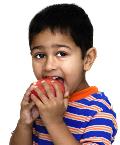We are often asked if there is a link between diet and neurodiversity. Current research tells us that an elimination diet (not eating certain foods) or taking fatty acid supplement (e.g. Omega3) has no long term benefits and therefore is not recommended.

Food is so much more than just sustenance. Eating can be a source of comfort, pleasure a treat or bribe as well as being a social act. Hence a greater focus for families should be on the general healthiness of the foods eaten. As you may already be aware a diet containing high levels of refined sugar and saturated fat can increase the risk of impulsiveness and hyperactivity. Some go on to suggest that Adolescents who consume a Western diet, characterised by a high intake of refined carbohydrates, sugars and sodium, total and saturated fats, and lower intake of omega-3 fatty acids, fibre and folate, showed a higher prevalence of ADHD core symptoms.
If you feel that foods your children / young adults are consuming are effecting their hyperactivity then keep a food diary and log what type of behaviours you are seeing after the food is eaten. If the dairy shows a pattern between specific foods and drinks and behaviour then discuss this with your Community Paediatrician, Doctor or Specialist Nurse for advice.
Studies have shown colourings and preservatives have negative effects on the behaviour of children with or without ADHD and the Food Standards Agency list the 6 food colours most closely linked to hyperactivity in children are:
- E102 (tartrazine)
- E104 (quinoline yellow)
- E110 (sunset yellow FCF)
- E122 (carmoisine)
- E124 (ponceau 4R)
- E129 (allura red)
These colours are used in several foods, including soft drinks, sweets, cakes and ice cream.
Unfortunately, takeout and restaurant meals often lack important nutrients that your body needs. However when you cook at home, you know exactly what you’re putting into your dish. You can use fresh and healthy ingredients that are low in fat, sugar, and salt without artificial ingredients and additives that can make ADHD symptoms worse for some people. Eating healthy foods can make ADHD symptoms easier to manage.
What do you think of this Neurodiversity Support Pack?- please let us know if there is anything we can improve on or if you have any suggestions for content by clicking on this link
How to use the Neurodiversity Support Pack
All the pages in this pack can be translated into your native language as text or audio via our Recite feature which you will find at the top of each page. The translated page can also be downloaded. More information about using our translation service can be found by
clicking here.